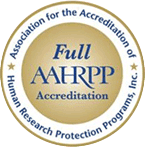POLICY
Reportable incidents and certain IRB determinations will be promptly reported to appropriate authorities and agencies.
Key Terms
Unanticipated problem involving risk to participants or others is a problem that is unanticipated or unexpected, related to the research and places subjects or others at a greater risk of harm than was previously known or recognized.
PROCEDURE
Reportable Incidents: The Institutional Official or designee will report the following IRB determinations:
- IRB determination of unanticipated problems involving risks to subjects or others;
- IRB determination of serious or continuing noncompliance; and
- Any suspension or termination of IRB approval.
Report Recipients: IRB Director or designee will report incidents to the following entities as applicable:
- Institutional Official (IO):
- IO for UTHealth for all research under IRB jurisdiction.
- IO for Memorial Hermann Hospital System for all research being conducted by Memorial Hermann staff or in Memorial Hermann facilities.
- IO for Harris Health System for all research being conducted in Harris Health facilities.
- OHRP for all nonexempt human subjects research that is:
- conducted or supported by HHS;
- conducted or supported by any non-HHS federal department or agency that has adopted the Common Rule and is covered by a Federalwide Assurance (FWA) determined to be appropriate for such research; or
- covered by an FWA, regardless of funding source.
- Sponsor, if applicable including federal agencies like Department of Defense, Department of Education etc.
- FDA for applicable clinical investigations.
Information Included in The Report:
- Name of the institution conducting the research;
- Title of the research project and/or grant proposal in which the problem occurred;
- Name of the Principal Investigator on the protocol;
- Number of the research project assigned by the IRB and the number of any applicable federal award(s) (grant, contract, or cooperative agreement);
- A detailed description of the problem; and
- Actions the institution is taking or plans to take to address the problem.
Reporting Procedure
The IRB director or designee will prepare the incident report. The IRB director or designee may solicit guidance from the Executive Chairperson or Chairperson of the IRB that reviewed the protocol to prepare this report.
The IRB director will submit the report to the IO and / or OHRP as applicable. The UTHealth IO may forward a copy of the letter to:
- Office of Legal Affairs and Institutional Compliance;
- Chair of the Principal Investigator’s department;
- Dean of the school of the Principal Investigator, staff or student;
- Office of Sponsored Projects Administration for research that receives funding by grant or contract;
- Any other authority as deemed appropriate.
Time frame for reporting incidents – The IRB director or designee shall report all incidents within 30 days of the IRB decision. The IRB Director or designee may send an initial report, and indicate that a follow-up or final report will be submitted by a specific date, when an investigation has been completed or a corrective action plan has been implemented.
Exception - When continuing review of a research protocol does not occur prior to the end of the approval period specified by CPHS, CPHS approval expires automatically. Such expiration of CPHS approval will not be reported to OHRP and IO as a suspension of IRB approval.
APPLICABLE REGULATIONS
- 45 CFR 46 Protection of Human Subjects
- 21 CFR 56 Institutional Review Board
- OHRP Guidance on Reporting Incidents to OHRP
- Mandatory IRB Reporting: FDA Contacts
REFERENCE TO OTHER POLICIES
- Unanticipated Problems Involving Risks to Subjects or Others.
- Non compliance
- Suspensions and Terminations
ATTACHMENTS
- Flow chart – What incidents should be reported to OHRP?
If you find errors in this document, contact [email protected]
|
Document Number: |
101-E01 |
|
Document Name: |
Reporting |
|
Reviewed by: |
Executive Director, Research Compliance |
|
Effective: |
1 Jan 2009 |
|
Revision History: |
1 Aug 2011, 1 Jun 2016, 21 Jan 2019, 1 Jun 2021 |
CPHS HELPLINE: 713-500-7943
iRIS HELPLINE: 713-500-7960
UTHealth Houston Compliance Hotline: 800-846-0632 (English & Spanish)
IRB OFFICE HOURS: Thursdays, 1–4pm via Teams Room
Committee for the Protection of Human Subjects
7000 Fannin St, Suite 1840Houston, Texas 77030
Phone: 713-500-7943
Fax: 713-500-7951
Email: [email protected]
Committee for the Protection of Human Subjects
IRIS Support: 713-500-7960
